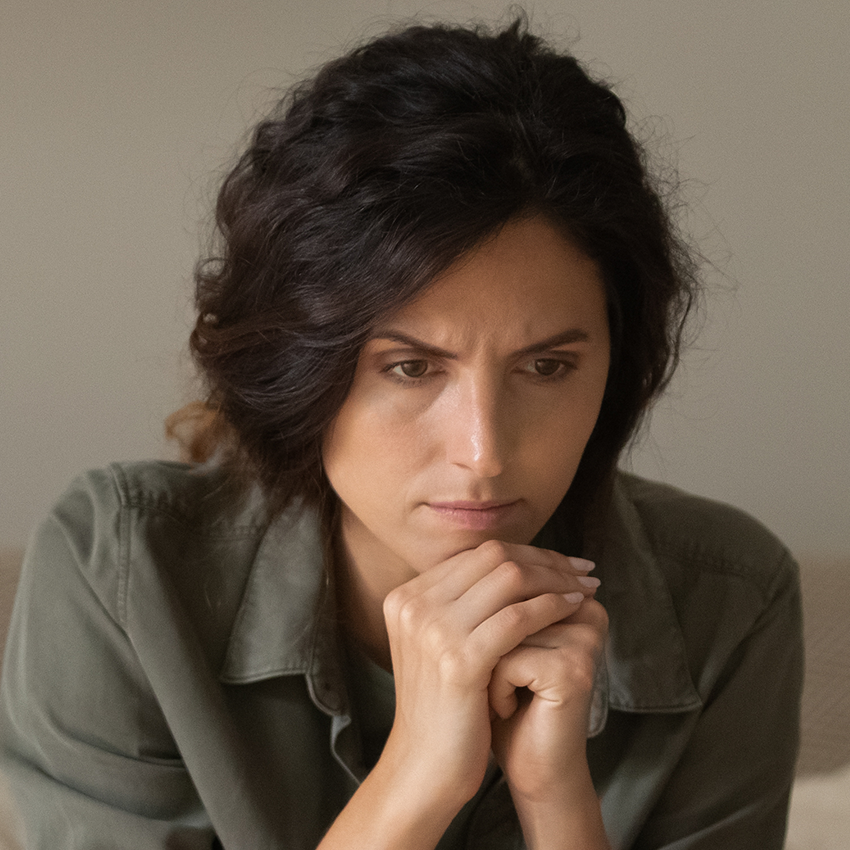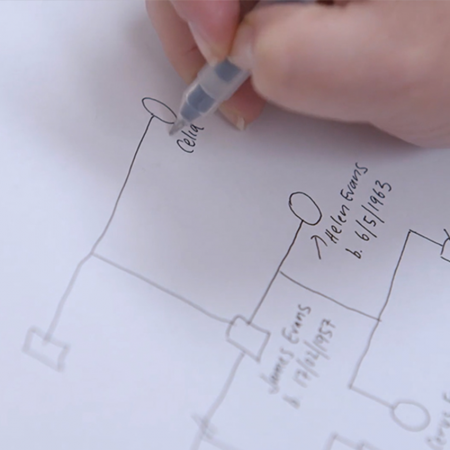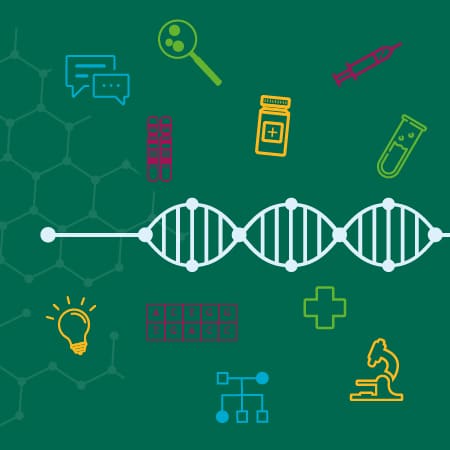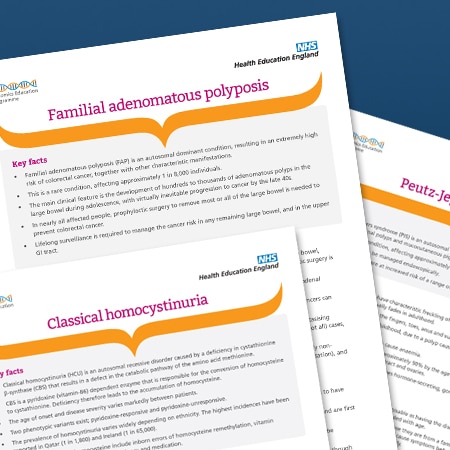In this teaching scenario, Rachel describes her experiences of caring for two children with cystic fibrosis, an autosomal recessive condition
A mother describes how having two children with cystic fibrosis has impacted on her family’s life. Rachel also discusses her interactions with healthcare professionals during her pregnancies and following the birth of her children.
Read Rachel’s story below and use the teaching moments and discussion points to design your teaching session.
AT-A-GLANCE
Clinical focus: Rare disease
Nursing activities: Management, management and ongoing care, communication, identification
NMC platform and outcomes: 1 (1.9, 1.13, 1.18); 2 (2.4, 2.9, 2.10); 3 (3.2, 3.3, 3.5, 3.15, 3.16); 4 (4.2, 4.3, 4.5, 4.14, 4.15, 4.17); 5 (5.4); 7 (7.1, 7.8)
Rachel’s story
Identification and diagnosis
1 How did we find out about our children having cystic fibrosis (CF)? When I was 22 weeks pregnant with my eldest, now four years old, her bowel was echogenic on the anomaly scan. They took blood samples from my husband and me to check for CF carrier status, and it came back that we were both carriers. We refused an amnio (amniocentesis), and when she was born, she had a blood sample taken which came back at eight days old to say she had CF.
2 With my son, we refused an amnio again. His bowel was fine on his anomaly scan, and he had a cord blood sample taken at birth which came back positive for CF at seven days old. There is no history of the condition in either of our families.
Managing CF
3 Our children having CF has changed our lives in every way imaginable, for example: not expecting grandchildren, spending a lot of time at the hospital and an extremely different daily routine to that of parents with healthy children, including two and a half hours a day doing physio and three hours a day of intravenous medicine. I have to give my son a total of 26 doses of oral medications per day, and my daughter a total of 11 doses of oral medications per day. I have had severe post-natal depression after both children were born.
4 My marriage has been put under intense strain from all the emotional stress involved in caring for our children. Our children can’t live a normal life, and we can’t be normal parents. We don’t think the thoughts that normal parents would. We don’t take their health or life expectancy for granted. We take tons of photos, to remember as much as we can of them growing up. My husband has had to have a vasectomy as we couldn’t possibly have any more children, even though we long to have another child.
5 Our clinical experience has been mostly positive, but inconsistent depending on the area. Care while pregnant with my daughter was unsatisfactory. We were told very little when the problems initially came to light and weren’t treated sympathetically or told anything about them. No-one tried to make it any easier for us, refusing us test results etc. I had an awful birth with my daughter and nearly lost her. They’d promised to get her out at the first sign of trouble during labour but left her for hours and she nearly died.
6 Care from our local hospital has been great. They’re always there when we’ve needed them and have given effective treatments to my daughter. We’ve had some disagreements over my son’s treatment, mostly because they’ve not listened to a mother’s instinct, and I’ve been proved right in the end.
7 Care from the larger teaching hospital was good when I was pregnant with my daughter and went there for specialist scans, but I wasn’t happy with the care my son received there when he went in for his portacath surgery.
8 The care from our CF community nurse has been impeccable. She’s at the end of the phone whenever we need her, very well informed, can guess quite accurately what the consultant will say to us, explains lots of stuff for us. She comes to the house whenever we need her to, has helped set up my daughter’s care plan at pre-school and gave us my son’s CF results in person. We couldn’t manage without her.
Improving care
9 How could care be improved? That’s not an easy question. Listen to parents more because we know our children better than anyone – we are with them 24/7. Be more sympathetic and supportive during pregnancy. Don’t be afraid to say ‘I don’t know’ instead of guessing, being wrong and losing parents’ trust.
10 When they found out my daughter had CF, we just saw the CF paediatrician after that. They then directed us to the CF Trust website and got us pamphlets sent from the CF Trust especially for new parents, but to be honest, we weren’t ready for more information. We just wanted to know what we needed to know for caring for her, not all the detailed background info. When we were ready, we researched it ourselves.
11 We did have one session of genetic counselling just after my son was born, but by then it was far too late. In fact, it was more of an inconvenience than anything – all they did was explain how CF is carried, which we already knew! They even told us that there was nothing else they could say to us, just to let them know if my daughter or my son wanted advice about family planning in the future.
12 Our care would have been improved by the doctor who had to explain to us all about echogenic bowel actually knowing what echogenic bowel was. He read off a sheet to us about it – the same sheet we’d already read in the waiting room 10 times. Then he offered us an amnio and possibly a termination, which we didn’t want. He totally gave the impression of not caring and not wanting to care, not wanting to be there.
13 Our care would also have been improved by the doctors involved being more empathetic to the traumatic events of the day, being more honest with us and knowing more about CF.
14 When they rang us to say our results were back, we had to battle to get them to tell us over the phone, as we didn’t want the results in person – we wanted time to absorb the results before seeing the specialists. I know that CF is fairly rare in the grand scheme of life – I’d never even heard of it before they said my daughter might have it at 22 weeks pregnant – so I know it’s unreasonable to expect every doctor and nurse to know lots about it, but it would have made things so much easier if midwives knew more about echogenic bowel and CF, especially as they are now planning to test for CF routinely on the Guthrie test throughout the UK.
15 Another little thing that could make things easier – actually reading my daughter’s or my son’s notes instead of asking us the same questions about 10 times a day. Every doctor would ask what meds they were on, what doses, what times, and want their full history from us, every time! Sometimes even asking us two or three times within the same conversation.
16 Also, what makes our life harder is seeing registrars, or even consultants, on the children’s ward who know very little about CF. Someone with CF is managed very differently to the average child: antibiotics are prescribed earlier, extra tests are performed, etc, and yet time and time again we have to fight tooth and nail for the appropriate treatment from registrars and consultants on the ward.
Care from nurses
17 The nurses that we have encountered sometimes don’t know what CF is, or don’t know much about it, and usually want to talk about their treatments and their history.
18 We’ve never had any negative reactions to health professionals finding out about our children having CF, and usually nurses are very supportive. I couldn’t wish for better nurses on our local children’s ward, they are very empathetic, supportive, making cups of tea, talking to me when I get upset about the doctors being so frustrating and not listening to me, and they genuinely care about my son (my daughter has always been very well, so they rarely see her and we don’t have the same relationship) and want to see him get well. They were also excellent at teaching me to give IVs through his port during his current course of IVs. I view them almost as friends.
Educator touchpoints
Teaching moments
Paragraph 1 | What is cystic fibrosis (CF) and how is it inherited?
Paragraph 1 | What is meant by ‘carrier status’?
Paragraph 2 | ‘There is no history of the condition in either of our families’. How is this linked to the inheritance pattern?
Paragraph 9 | When communicating sensitive information, what considerations must be taken, especially those linked to genetic conditions, for example, feelings of guilt?
Paragraph 11 | What is a genetic counsellor?
Paragraph 16 | Do CF specialist nurses exist?
Paragraph 18 | Why might the son be experiencing more complications than his sister?
Discussion points
Paragraph 1 | Why might the family have refused amniocentesis? Explore the importance of informed choice.
Paragraph 3 | Why do the parents not expect to have grandchildren?
Paragraph 3 | Discuss the importance of recognising additional support that families may need and where they can receive it.
Paragraph 4 | Explore the need for patient-centred conversations, especially for sensitive topics such as reproductive choices following the diagnosis of an inherited condition.
Paragraph 6 | Discuss how to effectively manage conversations with parents, especially when they know their children and the condition so well. Think about the benefits of patient-centred care and working in partnership with the family.
Paragraph 8 | How has having a dedicated specialist nurse helped the family? Are there other nurses that might support the family outside of secondary care, for example, practice nurses?
Paragraph 9 | Is it better to admit that you don’t know much about the condition? Discuss the benefits of being honest with families.
Paragraph 11 | What else could the genetic counsellors have discussed with the family? For example, reproductive choices or preimplantation diagnosis.
Paragraph 15 | Why might the family be asked the same questions repeatedly?
Paragraph 17 | How else could nurses have supported Rachel and her family?
Further learning
FOUNDATION KNOWLEDGE
Gain an insight into the role that genetic counsellors play in patient care
5 minutes
Learn the different ways that genetic conditions can be inherited within a family
30 minutes
Tips and tools for communicating with patients about genomics
30 minutes
EXTENDED LEARNING
Key facts about the condition, including its clinical features and genetic basis
5 minutes







